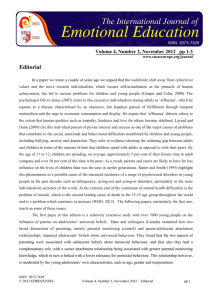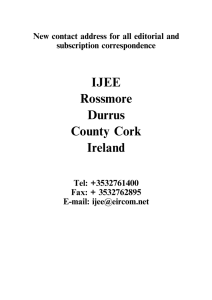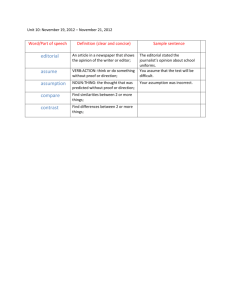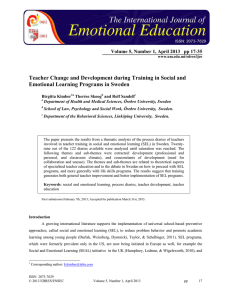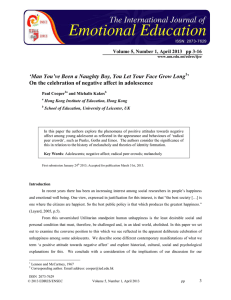Editorial Volume 5, Number 1, April 2013 pp 1-2
advertisement
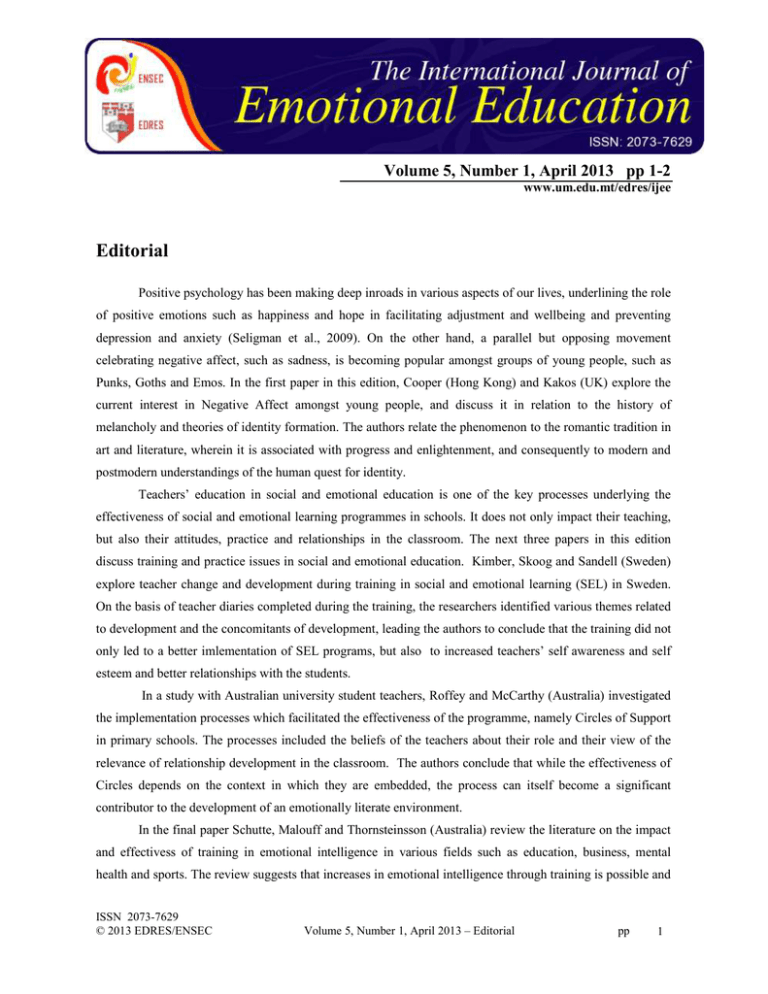
Volume 5, Number 1, April 2013 pp 1-2 www.um.edu.mt/edres/ijee Editorial Positive psychology has been making deep inroads in various aspects of our lives, underlining the role of positive emotions such as happiness and hope in facilitating adjustment and wellbeing and preventing depression and anxiety (Seligman et al., 2009). On the other hand, a parallel but opposing movement celebrating negative affect, such as sadness, is becoming popular amongst groups of young people, such as Punks, Goths and Emos. In the first paper in this edition, Cooper (Hong Kong) and Kakos (UK) explore the current interest in Negative Affect amongst young people, and discuss it in relation to the history of melancholy and theories of identity formation. The authors relate the phenomenon to the romantic tradition in art and literature, wherein it is associated with progress and enlightenment, and consequently to modern and postmodern understandings of the human quest for identity. Teachers’ education in social and emotional education is one of the key processes underlying the effectiveness of social and emotional learning programmes in schools. It does not only impact their teaching, but also their attitudes, practice and relationships in the classroom. The next three papers in this edition discuss training and practice issues in social and emotional education. Kimber, Skoog and Sandell (Sweden) explore teacher change and development during training in social and emotional learning (SEL) in Sweden. On the basis of teacher diaries completed during the training, the researchers identified various themes related to development and the concomitants of development, leading the authors to conclude that the training did not only led to a better imlementation of SEL programs, but also to increased teachers’ self awareness and self esteem and better relationships with the students. In a study with Australian university student teachers, Roffey and McCarthy (Australia) investigated the implementation processes which facilitated the effectiveness of the programme, namely Circles of Support in primary schools. The processes included the beliefs of the teachers about their role and their view of the relevance of relationship development in the classroom. The authors conclude that while the effectiveness of Circles depends on the context in which they are embedded, the process can itself become a significant contributor to the development of an emotionally literate environment. In the final paper Schutte, Malouff and Thornsteinsson (Australia) review the literature on the impact and effectivess of training in emotional intelligence in various fields such as education, business, mental health and sports. The review suggests that increases in emotional intelligence through training is possible and ISSN 2073-7629 © 2013 EDRES/ENSEC Volume 5, Number 1, April 2013 – Editorial pp 1 that such training leads to consequent positive outcomes related to health, relationships and work performance amongst others. More work remains to be done however, to uncover the processes which lead to increases in emotional intelligence and to identify what specific training works best. We would like to welcome Paul Downes as Reviews Editor helped by Paul Bartolo and Maria Poulou. We would also like to welcome Natalie Haber as the Journal’s Editorial Assistant. We are pleased to announce that the Journal is now indexed in the APA Psychlit and will soon be on the open access index as well. As from this edition we have removed the requirement registration to gain access to the current issue, as well as the required registration with ENSEC to access the journal archive. This means that from now IJEE is a completely open access journal, with all current and past issues being freely available to anyone with access to our web site. This will broaden the reach of the journal and increase article submissions. We are also presently making plans to include the journal in other international indices as well. Reference: Seligman, M., Gillham, J., Reivich, K., Linkins, M., & Ernst, R. (2009). Positive Education. Oxford Review of Education , 35(3), 293-311. Paul Cooper & Carmel Cefai April 2013 ISSN 2073-7629 © 2013 EDRES/ENSEC Volume 5, Number 1, April 2013 – Editorial pp 2
